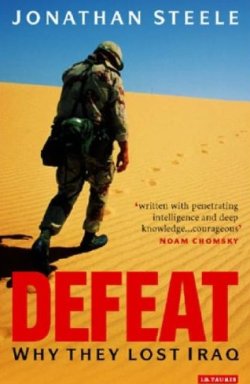« Sólo es el calentamiento | Main | Condenado a muerte en Afganistán »
Enero 23, 2008
Blair, el estratega

Jonathan Steele, de The Guardian, desmonta en el libro "Defeat" esa idea tan extendida que dice que los británicos fueron a la guerra de Irak sin tanta ignorancia y parafernalia patriótica como los norteamericanos. Al menos, su comandante en jefe, Tony Blair, demostró la misma falta de interés en lo que podría ocurrir en Irak el día después del derrocamiento de Sadam que la que fue tan evidente en el caso de su amigo George.
Blair convocó cuatro meses antes de la invasión a unos cuantos catedráticos, expertos en Irak y en relaciones internacionales, para escuchar sus consejos. En realidad, sólo quería oír lo malo, malísimo que era Sadam, según cuenta Steele en su libro:
"We all pretty much said the same thing," Joffe recalls. "Iraq is a very complicated country, there are tremendous intercommunal resentments, and don't imagine you'll be welcomed." He remembers how Blair reacted. "He looked at me and said, 'But the man's uniquely evil, isn't he?' I was a bit nonplussed. It didn't seem to be very relevant." Recovering, Joffe went on to argue that Saddam was constrained by various factors, to which Blair merely repeated his first point: "He can make choices, can't he?" As Joffe puts it, "He meant he can choose to be good or evil, I suppose."Joffe got the impression of "someone with a very shallow mind, who's not interested in issues other than the personalities of the top people, no interest in social forces, political trends, etc".
Dodge also struggled to convince Blair of the obstacles that would face anyone who occupied Iraq. "Much of the rhetoric from Washington appeared to depict Saddam's regime as something separate from Iraqi society," he remembers. "All you had to do was remove him and the 60 bad men around him. What we wanted to get across was that over 35 years the regime had embedded itself into Iraqi society, broken it down and totally transformed it. We would be going into a vacuum, where there were no allies to be found, except possibly for the Kurds."
The experts didn't seem to make much of an impression. Blair "wasn't focused", Tripp recalls. "I felt he wanted us to reinforce his gut instinct that Saddam was a monster. It was a weird mixture of total cynicism and moral fervour."
The Guardian publica hoy otro extracto del libro, "We had no idea we were not wanted", sobre el desastre de Faluya.
Posted by Iñigo at Enero 23, 2008 12:07 AM
Trackback Pings
TrackBack URL for this entry:
http://www.escolar.net/cgibin/MT/mt-tb.cgi/9706
Comments
Hola, he llegado a tu página y la encuentro bastante interesante. Sobre el libro en cuestión, imagino que aun no hay edicion en español, espero que la tenga pronto. Saludos y buen trabajo¡¡.
Posted by: darkerr at Enero 23, 2008 06:08 AM